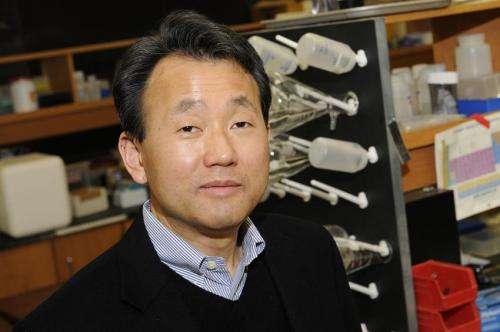Cholesterol activates signaling pathway that promotes cancer

Everyone knows that cholesterol, at least the bad kind, can cause heart disease and hardening of the arteries. Now, researchers at the University of Illinois at Chicago describe a new role for cholesterol in the activation of a cellular signaling pathway that has been linked to cancer.
The finding is reported in Nature Communications.
Cells employ thousands of signaling pathways to conduct their functions. Canonical Wnt signaling is a pathway that promotes cell growth and division and is most active in embryonic cells during development. Overactivity of this signaling pathway in mature cells is thought to be a major driver in the development of cancer.
"Our research points to a new regulatory role for cholesterol, and also presents an exciting new therapeutic target for suppressing canonical Wnt signaling to treat or prevent cancer," said Wonhwa Cho, professor of chemistry at UIC and principal investigator of the research.
Cho and his colleagues were searching for novel cholesterol-binding proteins when they discovered a binding site for cholesterol on a protein called Dishevelled. Dishevelled is involved in canonical Wnt signaling and in non-canonical Wnt signaling, which plays a role in processes like cell movement and organization. Dishevelled is like a switch on the track—when the signal reaches Dishevelled, the signal is directed along either the canonical or non-canonical Wnt pathway. But until now, any factor governing activation of one pathway over the other was unknown, Cho said.
"Once we realized that cholesterol is able to bind specifically to Dishevelled, we became interested in cholesterol as a potential determinant of which of the Wnt signaling pathways gets activated," he said.
The researchers found that when cholesterol is bound to Dishevelled, the signal continues along the canonical Wnt signaling pathway. Without cholesterol, canonical Wnt signaling cannot occur.
They also noticed that localized increases in cholesterol within cell membrane seemed to selectively promote canonical Wnt signaling over non-canonical Wnt signaling—a finding, Cho said, that might explain why elevated cholesterol increases cancer risk.
"We know that things like high-fat diets, which boost cholesterol levels, have been linked to an elevated incidence of cancer," he said. "Our research provides a mechanism for how cholesterol promotes pathways that lead to cancer."
It also presents a possible therapeutic target. A drug that interferes with the binding of cholesterol to Dishevelled, Cho said, may be effective against those cancers that are driven by canonical Wnt signaling—a list that includes colon cancer, melanoma, breast cancer and lung cancer.

















